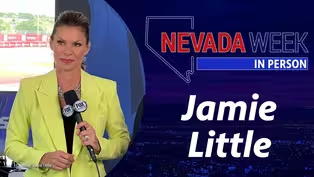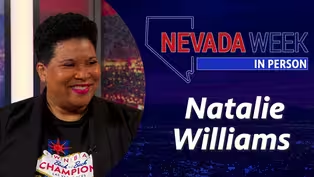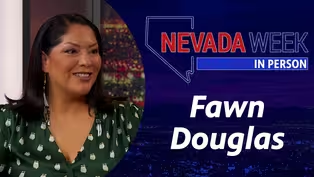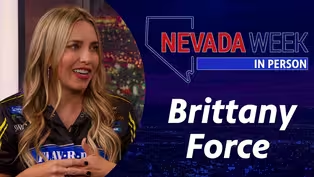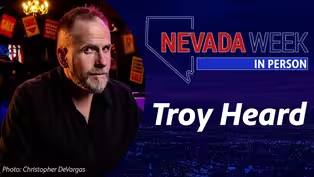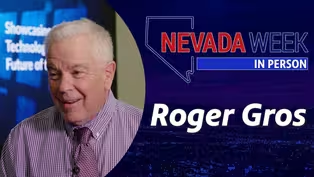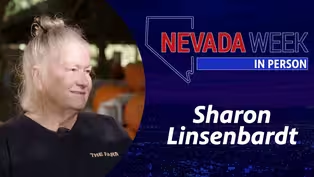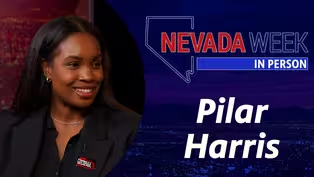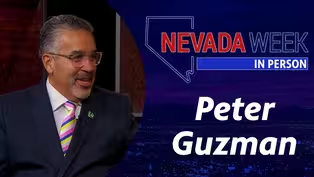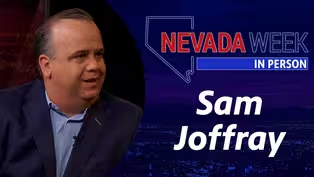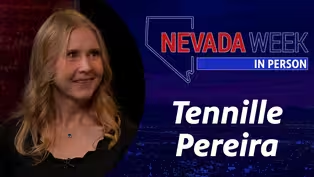
Nevada Week In Person | Randy Couture
Season 1 Episode 92 | 14mVideo has Closed Captions
One-on-one interview with Randy Couture, UFC Hall of Famer & U.S. Army Veteran
One-on-one interview with Randy Couture, UFC Hall of Famer & U.S. Army Veteran
Problems playing video? | Closed Captioning Feedback
Problems playing video? | Closed Captioning Feedback
Nevada Week In Person is a local public television program presented by Vegas PBS

Nevada Week In Person | Randy Couture
Season 1 Episode 92 | 14mVideo has Closed Captions
One-on-one interview with Randy Couture, UFC Hall of Famer & U.S. Army Veteran
Problems playing video? | Closed Captioning Feedback
How to Watch Nevada Week In Person
Nevada Week In Person is available to stream on pbs.org and the free PBS App, available on iPhone, Apple TV, Android TV, Android smartphones, Amazon Fire TV, Amazon Fire Tablet, Roku, Samsung Smart TV, and Vizio.
Providing Support for PBS.org
Learn Moreabout PBS online sponsorshipMore from This Collection
Nevada Week In Person goes beyond the roundtable discussion of Nevada Week with guests for a more casual conversation about their personal passions, new projects and compelling stories that are overlooked in the flurry of the news cycle.
Nevada Week In Person | Jamie Little
Video has Closed Captions
One-on-one interview with Jamie Little, NASCAR Broadcaster (14m)
Nevada Week In Person | Chet Buchanan
Video has Closed Captions
One-on-one interview with Chet Buchanan,Host & Creator, 98.5 KLUC’s The Chet Buchanan Show (14m)
Nevada Week In Person | Natalie Williams
Video has Closed Captions
One-on-one interview with Natalie Williams, General Manager, Las Vegas Aces (14m)
Nevada Week In Person | Fawn Douglas
Video has Closed Captions
One-on-one interview with Fawn Douglas, Artist and Activist, Nuwu Art (14m)
Nevada Week In Person | Brittany Force
Video has Closed Captions
One-on-one interview with Brittany Force, World Champion Drag Racer (14m)
Nevada Week In Person | Troy Heard
Video has Closed Captions
One-on-one interview with Troy Heard, Artistic Director, Majestic Repertory Theatre (14m)
Nevada Week In Person | Roger Gros
Video has Closed Captions
One-on-one interview with Roger Gros, Publisher, Global Gaming Business Magazine (14m)
Video has Closed Captions
One-on-one interview with Sharon Linsenbardt, Owner, Las Vegas Farm and Barn Buddies Rescu (14m)
Nevada Week In Person | Pilar Harris
Video has Closed Captions
One-on-one interview with Pilar Harris (14m)
Nevada Week In Person | Peter Guzman
Video has Closed Captions
One-on-one interview with Latin Chamber of Commerce Nevada President & CEO Peter Guzman (14m)
Nevada Week In Person | Sam Joffray
Video has Closed Captions
One-on-one interview with Sam Joffray, President & CEO, Las Vegas Super Bowl LVII Host Com (14m)
Nevada Week In Person | Tennille Pereira
Video has Closed Captions
One-on-one interview with Tennille Pereira, Director, Vegas Strong Resiliency Center (14m)
Providing Support for PBS.org
Learn Moreabout PBS online sponsorshipA U.S. Army Veteran and UFC Hall of Famer, Randy Couture is our guest this week on Nevada Week In Person.
♪♪♪ Support for Nevada Week In Person is provided by Senator William H. Hernstadt.
Welcome to Nevada Week In Person.
I'm Amber Renee Dixon.
During a Hall of Fame UFC career that saw him win titles in the heavyweight and light heavyweight divisions, he opened what would become a prestigious mixed martial arts gym in Las Vegas and founded the Xtreme Couture GI Foundation, a nonprofit that raises money and awareness for combat veterans.
Randy Couture, thank you for joining Nevada Week In Person.
(Randy Couture) Thank you.
I appreciate you having me on.
-So let's start off with your military service.
November 11 is Veterans Day.
You served six years in the U.S. Army.
What kind of impact do you think that had on you as a person?
-I think it definitely had a huge impact as I signed and took that oath at 19 years old.
So 19 to 25, pretty formative time in my life, I wore that uniform.
My first duty station was in Hannow, West Germany.
I had a child on the way and got married to support a family, and the Army was going to help me do that.
I thought wrestling was over for me.
You know?
Doing what I needed to do to support the family, and little did I know there were 5 million soldiers in the peak of the Cold War stationed in Central Europe.
And wrestling and boxing were huge sports programs over there for morale.
So I ended up back on the wrestling mat and ended up eventually qualifying for the '88 Olympic trials as a soldier-- -Wow!
- --and supported my family.
My daughter was actually born in Frankfurt, West Germany when we were stationed over there.
-All right.
So 2009 is when you open that nonprofit that is helping wounded veterans who are transitioning back to civilian life.
What happened that made you say this nonprofit is so necessary?
-Yeah, for me, '06 I got to go to Iraq.
And I spent 12 days on the ground over there, went to five different FOBs, visited a bunch of soldiers in the combat zone.
And the following year in '07, I got to go to Walter Reed in Bethesda to the Fisher House, which is their version of the Ronald McDonald House that helps caretakers.
That's moms, fathers, wives, whose loved one is in the hospital getting fitted for prosthetics, learning to walk again, going through surgeries after being wounded.
And it was there, walk in the wards for the first time and meeting a bunch of soldiers fresh off that battlefield, hearing those horror stories about losing jobs, losing houses, cars, and parking garages and things like that, that were disturbing.
It bothered me that these men and women weren't being taken care of properly and financially in significant issue.
And so that was the impetus for me to file for 501c3 status and start doing what we've been doing at Xtreme Couture.
-So it was a different experience for you in the military versus what you were seeing firsthand there?
-Absolutely.
The peak of the Cold War, there wasn't a lot of combat, a lot of action going on.
And I took that same oath and did all that same training and never had to put it on the line, frankly.
Since 9/11, a lot of folks, men and women, have both had to do just that, do all those things I trained to do and never had to do.
So I wanted to find a way to give back to help those men and women that have made that sacrifice and done that.
-2009, I mentioned, is when you started the nonprofit.
That was two years prior to your retirement from the Ultimate Fighting Championship.
You retired at 47 years old.
What do you contribute your longevity to?
-I think wrestling, obviously, is a particular mindset and a certain level of conditioning.
And it's a lifestyle sport, Blue Collar athletes whose fathers and uncles all wrestled, and they end up on the wrestling mat.
That's what brought me on the wrestling mat.
I think that there's a-- it breeds a particular character and a mindset that translates to solving almost any problem, frankly.
And fighting is problem solving.
You're walking up in that cage to solve the problem that that guy poses across the cage from you.
And wrestling is very similar, individual combative sport with different rules of engagement.
So fighting became an extension of wrestling for me, and I've been wrestling since I was 10 years old.
-Fighting and problem solving, I haven't heard those two put together.
You got a late start in the UFC at 33 years old, 33 years old, but at that time, it was 1997, the UFC was only a few years old.
And around that time, the late Senator John McCain described it as "human cockfighting."
What did you think of that assessment?
-I didn't agree with his assessment of the sport.
You know, obviously he had some ties to Anheuser-Busch and boxing that, that were, I think, the impetus for him kind of lashing out against us politically as a sport and calling us a freak show and a fringe sport and gladiator games and some of the stuff they said about us then.
I think we were misunderstood for a long time, who we were and what we did.
Most of us are college educated guys.
This was our opportunity to be a professional athlete in our society, which is a pretty big deal.
So I don't think there was anything dangerous about the sport.
I think it was largely misunderstood and slowly ran towards regulation, making it a legitimate sport in a combative sport sense.
And here we are.
It's the fastest growing sport on the globe, and it just continues to flourish.
-Granted, when you were fighting in those early days, it was a lot different than the UFC is now.
-It was different.
No doubt about that.
There were four rules: No biting, no eye gouging, no groin strikes, and no striking the throat.
Outside of that, you could pretty much do whatever you wanted to do: Wear gloves, wear a gi, don't, wear shoes.
I mean, there, you know, pick and choose how you wanted to represent yourself.
And back then it was different.
Everybody was representing their martial arts background, trying to prove that they had the best fighting style.
And I think we realized very quickly that it wasn't one fighting style that encompassed everything you needed.
You had to crosstrain, you had to learn this other stuff, and then it became the hybrid sport that it is now through that process.
-And there were no rounds.
You once went 21 minutes-- -Yeah.
- --in your title fight with Maurice Smith, got a majority decision.
-Yeah.
-Twenty-one minutes, Randy.
The rounds now are five minutes.
-Yes, a little bit different back then.
You went a 15-minute round.
If they couldn't determine a winner by the end of that 15 minutes, then you went two 3-minute overtimes.
That occurred, you know, 21 minutes, and it was a little bit harder to understand.
Some guys would win those early minutes and wane in the later minutes, and then the other guy would end up winning.
It's like you forgot about all this stuff you did early.
So I think going to the round system and the 10-point must that we're so used to in boxing really helped the sport become more understandable and more recognizable as a combative sport.
-Prior to the UFC, you were a three-time NCAA All American, a three-time Olympic team alternate.
So your base was in wrestling, but it was boxing that earned you the nickname "The Natural."
How so?
How did that happen?
-Well, I specialized in a very unique style of wrestling that's not very popular in the United States, Greco-Roman wrestling.
It's one of the two Olympic styles, and it's a much more upright posture.
Judo without the gi, basically.
You learn to grab the human body and throw guys to score points instead of using the grips and the gi like you do in Judo or Jiu Jitsu.
And that particular style of wrestling translates very, very well to fighting.
So myself, Dan Henderson, Matt Lindland, Chael Sonnen, Joe Warren, I mean, there's a lot of us that came from that Greco-Roman wrestling background and transitioned into fighting and had some success.
-I mean, part of that is dirty boxing.
In MMA, you can hang onto somebody and punch them.
In boxing that's not allowed.
So I've fought Vitor Belfort in my second UFC show and kind of attached myself to him.
I knew if I could make him work a little harder than maybe he wanted to, I had a good shot at winning that fight.
And dirty boxing was kind of born in that fight.
So holding onto somebody in wrestling fashion and punching them, as you do, is kind of where that came from.
-You told me off camera, because of your ability to go toe to toe with him in boxing, there was a commentator that said-- -Yeah.
- --you're a natural.
-He wanted to call me "The Natural," and well, I've been called a lot worse things.
So it stuck.
I got a nickname.
-You also told me that you were boxing as a child.
-I wanted to box as a kid.
I was a huge fan of boxing.
Obviously, grew up in that golden era: Ali and Frazier and Foreman and Duran and Hagler and Hearns and literally the golden era of boxing in many ways.
And it was the one thing my mom forbid me to do was box, so we joke about that now.
-So the decision to open a gym, the decision to do it in Las Vegas, why Las Vegas and what went into opening that gym?
-I opened my first gym with Dan Henderson and Matt Lindland, who are two other fighters that, again, came from that Greco background up in Gresham, Oregon, Team Quest was the very first gym.
We realized quickly we had no idea how to run a gym and brought in Robert Follis, who had some experience running martial arts gyms.
And he kind of created the business side of that equation.
We were the fighters out winning titles and doing things, and Robert knew the nuts and bolts of how to run the business.
I ended up going through a divorce and needed to kind of clear the decks and reset, and that's when I moved here to Vegas.
And that was right when the first scene of The Ultimate Fighter was airing, which was in many ways changing the landscape for the sport of mixed martial arts, gaining us acceptance as a real sport and kind of shattering a lot of people's myths about who we were and what we did as athletes.
So it made sense to start my own gym and my own facility here.
There was no such thing as a mixed martial arts training center back then.
It was going to 24 Hour Fitness to do my strength conditioning and going to the college mat room to get partners or the jiu jitsu gym to get grappling partners and all the facets of what you need to be in shape and fight under one roof.
And that's where Team Quest and Lion's Den and Miletich Fighting Systems and some of these other mixed martial arts gyms kind of grew out of that necessity.
And Team Quest and Xtreme Couture were the same.
-Do you remember what it was like when you had your first World Champion come out of your gym and how that felt different from your own victories?
-It is an interesting thing, and you get just as excited for those guys that you're coaching and working with.
They're your teammates.
Certainly in the Team Quest days Evan Tanner, Dan Henderson, Matt Lindland all in title fights, all, you know, guys that I rubbed elbows with on a regular basis.
And you want to see those guys succeed, for sure.
-How does it compare seeing your own son win a fight, he is a retired professional mixed martial artist, compared to your own wins?
-Yeah.
We had to kind of come up with some tactics to deal with that adversity for sure.
He started wrestling in junior high school.
And I was like, man, it's a very tough sport.
I hope you're doing this because you have a genuine passion for the sport-- -As opposed-- - --and not trying to get my attention.
That's certainly what put me on a wrestling mat was trying to get a deadbeat dad's attention.
Now, I certainly wasn't a deadbeat, but I did put the kids through a divorce.
And that was a challenge for them and me, co-parenting and staying connected and being a positive influence in their lives.
I wanted to make sure he was getting on that mat for the right reasons.
I told him, I'm going to take a big step back.
You've got a coach.
You don't need my opinions.
If you want them, I'm happy to give them.
But you'll have to ask me for them.
We used that same approach when he ended up rolling into fighting and wanting to fight.
I brought him down here to manage the gym.
-He's now CEO-- -He's a smart kid.
He got a degree in math.
I needed a gym manager here I can trust while I'm traveling and doing all this stuff I'm doing.
So he was here about four months.
He's like, Dad, I want to fight.
I'm like, oh, man.
All right, here we go.
-Last thing.
You have so many titles.
I didn't include actor, but you were telling me last year you were in how many films?
You're most known for The Expendables series.
-Yeah.
Expendables, definitely one of the biggest properties I've been attached to.
And we just had Expendables 4 come out and did very, very well.
It was a fun project to be a part of and a great group of guys and gals to work with.
Certainly, if you're aspiring to be an actor, those are the group of people you want to kind of rub elbows with and see how they operate and how they approach this profession.
-How much training did you put into acting?
-I did it on a whim.
The UFC called and said, Hey, Cradle 2 the Grave is this movie with DMX and Jet Li.
They want authentic cage fighters.
Me, Chuck, and Tito all got the call to be in that film.
So it was my first time on a feature film set and kind of seeing behind the curtain, if you will, and how this whole thing unfolds and how it's made and was immediately intrigued by it.
So I was lucky enough to get-- to have that door opened through athletics and be able to walk through that door.
-I think you said five movies last year?
-Five movies in 2021.
Yeah, the most I've ever done in one year.
-Wow!
Randy Couture we could go on and on.
Thank you so much for joining Nevada Week In Person.
And to see more interviews like this, go to vegaspbs.org/nevadaweek.
♪♪♪

- News and Public Affairs

Top journalists deliver compelling original analysis of the hour's headlines.

- News and Public Affairs

FRONTLINE is investigative journalism that questions, explains and changes our world.












Support for PBS provided by:
Nevada Week In Person is a local public television program presented by Vegas PBS
